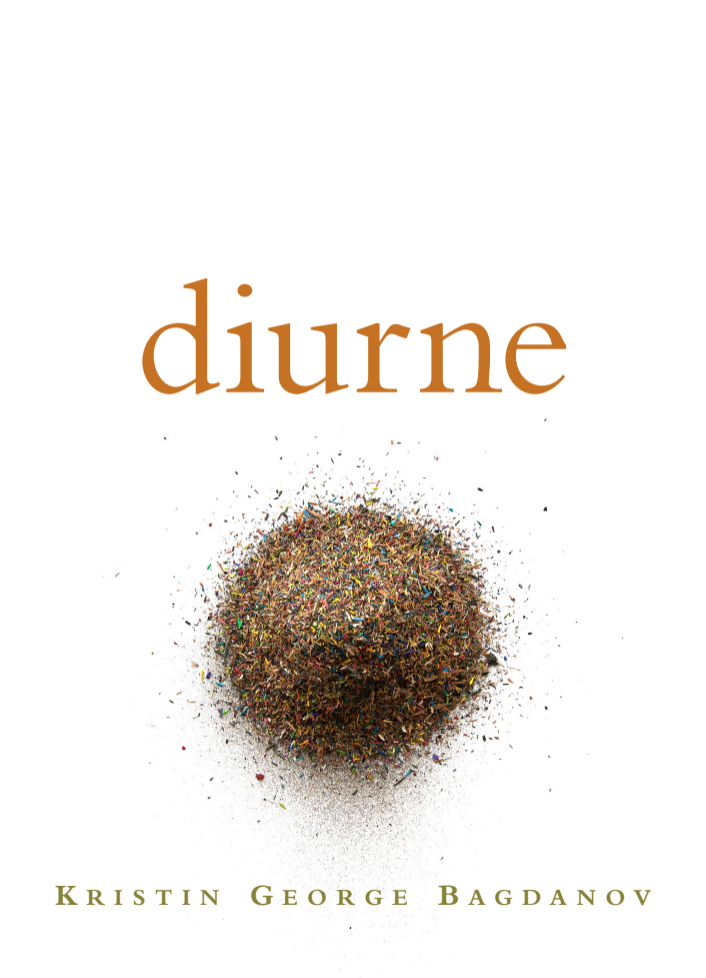ISSN: 1941-4137
POETRY THAT ENACTS THE ARTISTIC AND CREATIVE PURITY OF GLASS
POETRY THAT ENACTS THE ARTISTIC AND CREATIVE PURITY OF GLASS

Cody Stetzel received his MA in Creative Writing in poetry from the University of California at Davis. While from Rochester, New York, the former upstate & northeast hermit has replaced his slow-moving winter energies with the vitality of the west coast. His work has appeared in The East Coast Literary Review and Neovox: International.
June 16, 2020
Edited by Stephanie Kaylor
Edited by Stephanie Kaylor
Now That All These Opinions Have Been Refuted: Review of Diurne by Kristin George Bagdanov

Diurne
Kristin George Bagdanov
Tupelo Press, 2019
“We are tired of defining ourselves. By ourselves I mean all the bodies that have been classified as life/living by a system that prizes Geo over geo. How to become unliving without death as demarcation?”
— Kristin George Bagdanov, Diurne
“Our attitude begins with an overall image, of which all these subjects are aspects,” writes Francis Hallé in his text, Tropical Trees and Forests: An Architectural Analysis. Hallé, later known for more radicalizing texts on philosophical botany and relations between humans and plants, spent this first text documenting energy flows and networks within the tropical forest climes — the connectivity of understood architectures and geographies (thin: cityscapes, institutions, power networks), and the numerical analysis to prove the immense volume of physics behind this network of plantlife.
While dabbling more and more with makeup, the idea of blending has become prevalent for me; that, with enough patience and care, one can blend together discordant colors and schemas to various forms of beauty. In a way, Hallé has performed an act of blending with his discourse; to ensure a world full of energy, process, and complicated mechanisms of relation is acknowledged and understood becomes an act of blending these processes with the same processes only made more familiar due to their human accessibility (after all, it is quite difficult to relate with the thirstiness of a tree when their thirstiness is hidden behind thick layers of bark and our thirstiness is on Twitter, for all to see).
Kristin George Bagdanov’s Diurne (Tupelo Press, 2019) is an evocative blend for me, as well, in that it takes nuanced and complicated understandings of societal constructions, human interactions, and ecological necessities and presents them within the epistolary and diary genres — that one can access any number of worlds so long as they are to be understood under the guise of an unintended ode.
A spectacular achievement in diary and poetry and mindfulness; this book melds the real, surreal, and unreal in a neat alchemy of the mind. One of the most stark features of this book are the ever-increasing stakes of personal divulgence that several of Bagdanov’s poems end with. Bringing with it a dare, Bagdanov risks a level of investment and engagement for the reader — demanding their complicity in the sheer act of not abusing information provided. I think of this psychological projection in the mode of persona, but instead of personae-as-escape, George Bagdanov provokes the personae-as-infection; destined to give readers a clearer understanding of their own imaginations as opposed to the traditional poetic goal of swinging wide the padlocked doors to an Author’s imagination. Possibility is transfigured toward the reader’s capacity for creation and connection.
Blending occurs in more than an institutional or governing logic, too. George Bagdanov writes, “We rush to grow our skins thick then shed them. I track my progress line by line. Each day a new me in the mirror asking what I’ve been.” Within Diurne, we are taken through an exploration of daily reactivity, ruminations on headlines and hauntings. The spectacular is that one is living and responding to times such as these.
What’s more is that George Bagdanov gives me such great personal satisfaction in discussing the other works influencing Diode in-line. Magnusson’s Book of Minerals, a favorite, caught my attention immediately for its re-adaptation and inventive usage. I see the Book of Minerals as a highly spiritual manifesto, George Bagdanov points out its place within greater socio-cultural schemas such as class and revolutionary conflicts, eco-territory skirmishes. “Certain government bodies decide,” she writes, “what the acceptable levels of toxicity are for its citizenry.” While imagining George Bagdanov’s personae-as-infection, I do not imagine infection as a negative aspect, especially while juxtaposed with societally inflicted toxicity; instead, infection serves as a reminder of the natural intervention in a world so readily sculpted. I am reminded of Félix Guattari in Choasmosis: An ethico-aesthetic paradigm, speculating on the need for rapidly evolving everydayness to therein have rapidly evolving understandings and engagements with subjectivity,
“Beyond the relations of actualised forces, virtual ecology will not simply attempt to preserve the endangered species of cultural life but equally to engended conditions for the creation and development of unprecedented formations of subjectivity that have never been seen and never felt. This is to say that generalised ecology -or ecosophy will work as a science of ecosystems, as a bid for political regeneration, and as an ethical, aesthetic and analytic engagement.”
— Felix Guattari, Chaosmosis, 91
I enjoyed tracing the poignant remonstrations on interpersonal relationships through this work, too. Joyful snippets like, “I’ve noticed the days start and end poetically. Prose in the meantime,” or, “I always found the trick more magical once I knew its mechanism,” wherein I am enchanted by the attachment to this magical attribution to time. Diurne, that notion of dailiness, keeps me rooted in intention with my otherwise easily-distracted attentions.
Visit Kristin George Bagdanov' Website
Visit Tupelo Press's Website
Glass: A Journal of Poetry is published monthly by Glass Poetry Press.
All contents © the author.
All contents © the author.





